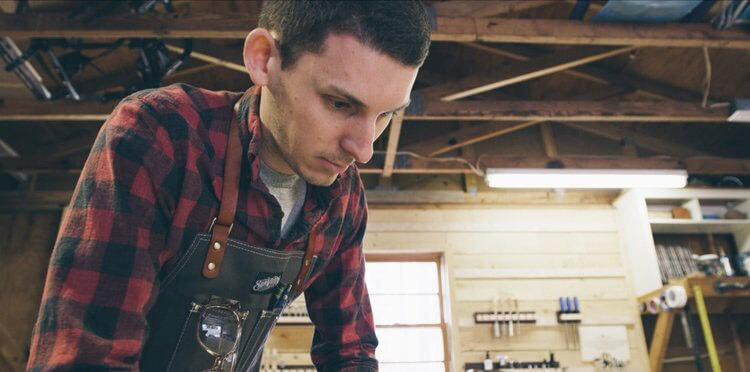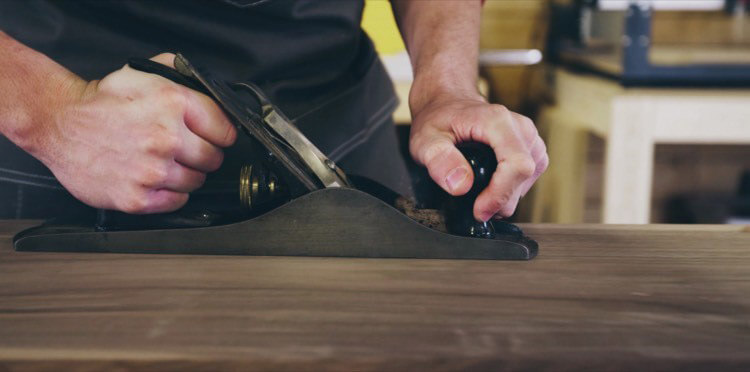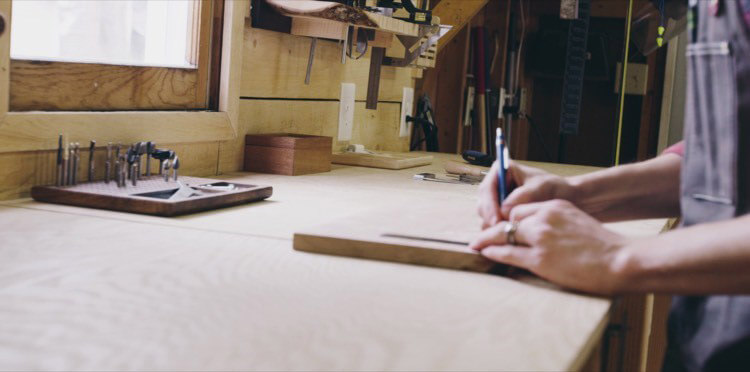
Japanese Garden Tools Vs. American: What’s the Difference?
You may have seen Japanese gardening tools popping up more in stores and online. Sure, they&rs… Read More

Jacob Hogue is the founder of Oak City Woodshop, a custom woodworking company specializing in both residential and commercial work, based in Raleigh, North Carolina. Interestingly enough, Jacob’s day-to-day profession is in the field of statistical programming, but Oak City Woodshop presents a means to promote his passion for woodworking.

While on the face of it, woodworking may seem like an unusual hobby for someone engaged in a deeply technical field like programming, Jacob’s love of building and working with his hands dates back to a fascination with Legos as a child. The so-called ‘maker influence’ was further strengthened by growing up with a father and uncle who were eager woodworking hobbyists engaged in frequent DIY projects (including a large, outdoor deck). It was during high school that he really started to gain a feel for the tools involved in woodworking. Once college beckoned, Jacob set out to study architecture, before switching into disciplines like pure math and teaching, that brought him to his current career. But that love for woodworking always remained.

They say necessity is the mother of invention, and while a junior in college Jacob’s woodworking grew out of his need to furnish an apartment. It was here that he used a few hand-me-down tools and first built some substantial items including a coffee table, TV stand and nightstand, all made with cheap, big box store lumber and countless screws. It wasn’t exactly ‘fine woodworking’ but it got the job done and, through it, Jake discovered a deep affinity for the process of woodworking—from the initial spark of inspiration, to the design and planning stages, and through to the final execution. In the ensuing years, these fledgling projects blossomed into opportunities to complete assorted projects for friends and family. They in turn encouraged Jacob to sell his work and move towards transforming from a mere hobby to a working business.

Jacob acquired the assorted skills and techniques needed to be a successful woodworker incrementally. He encourages other burgeoning hobbyists to learn in the same manner: start slowly with a small collection of affordable, staple tools and then branch out to acquire those more expensive, versatile tools that can help one work more expansively and efficiently on increasingly more elaborate projects. Be mindful of your own safety when working with tools and wear the right equipment at all times (like dust respirators—your lungs will thank you).
One of Jacob’s best pieces of advice is to watch and learn from other woodworkers and freely ask them questions. You can draw inspiration from other’s designs while striving to put one’s own personal spin on every project. Above all, do not fear failure. It is through some of his most spectacular mistakes that Jacob has continued to learn and sharpen his craft. As an example, it was only through hands-on experience that Jake gained a fuller understanding of the concept of ‘moisture content’ and ‘wood movement’. When trying to build things with ‘green’ wood (i.e. wood that hasn’t yet dried to a workable level), he found that one ran the risk of joints failing or boards splitting later on down the road when the wood properly started to dry out. Similarly, when building with dry wood one needs to design the piece taking into account those natural movements that can take place in wood over time (e.g screwing in breadboard ends to a dining table instead of letting them ‘float’). Though there is undeniable art in woodworking, there is also a need for planning, precision and ongoing education that neatly parallels with Jake’s work as a statistical programmer. Woodworking also affords him a welcome break from in-office, screen-based work.

To this day, each new build offers Jacob an immense sense of satisfaction in having ‘created something out of nothing’ for the next appreciative recipient and customer. While there are always challenges in juggling an existing career and marriage (plus dogs) with time-consuming woodwork, Jacob is unable to foresee ever giving up on his passion. He remains intrigued by the possibility of Oak City Woodshop growing enough to become a full-time job (the company now boasts customers from around the globe). At the same time, given he isn’t dependent on the venture for income, he wonders if that’s the very thing that keeps his woodworking fresh and enjoyable: the fact that it is absent the added layers of pressure and stress which could serve to otherwise stunt his passion.
Jacob’s dream project is not a commission, but something for himself: to make a guitar. A few years ago he tried to learn how to play and had a lot of fun doing so, but looking into the actual process of building of a guitar is what really drew him in. Making a guitar demands attention to countless small details, right down to choosing the right species of wood to enhance the type of sound one is looking for. While the process itself may sound tedious and laborious to some, for Jake it’s exactly the kind of challenge –with a sweet musical payoff– that he’s looking for.